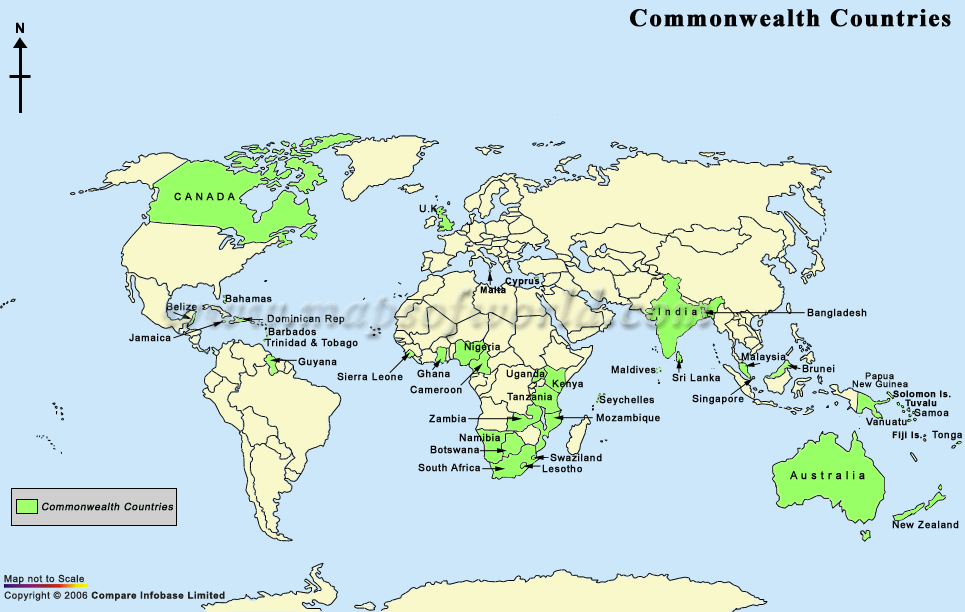As the British Empire began its process of decolonization and the creation of independent states from former British colonies, there arose a need for an organization of countries formerly part of the Empire. In 1884, Lord Rosebery, a British politician, described the changing British Empire as a "Commonwealth of Nations" .
The Commonwealth of Nations is one of the oldest international groupings of nations. The United Kingdom, Canada, Australia, New Zealand and South Africa were the modern Commonwealth's five original members created by the Treaty of Westminster in 1931. The Commonwealth has 53 member countries of which 33 are republics, 16 are monarchies with Queen Elizabeth II as their sovereign, and five others have national monarchies. These countries are found in all continents and all oceans. They are in North America, The Caribbean, Europe, the Mediterranean, Africa, Asia and the Pacific. They are also in the Atlantic, Indian and Pacific Oceans.
What is a Commonwealth citizen?
Any person who is a citizen of any member of the Commonwealth can be called a Commonwealth 'citizen'. He or she is part of the unique Commonwealth family. The Commonwealth has its headquarters at Marlborough House in London, United Kingdom. The Commonwealth Secretary-General is Hon Donald C McKinnon (New Zealand).
Big and Small:
The Commonwealth includes some of the world's biggest countries and some of its smallest. India, for example has nearly one billion people. The smallest are Nauru and Tuvalu in the Pacific ocean, each with about 11,000 people. The majority of the Commonwealth's members are developing countries.
Rich and Poor:
Commonwealth members are some of the world's richest countries and some of the poorest. Some of the richest are Australia, Canada, Singapore and the United Kingdom. Some of the poorest are Mozambique, Sierra Leone and Tanzania. The Commonwealth is often called a family of nations and of peoples.
How many people are there in the Commonwealth?
There are 2.2 billion people in the Commonwealth. That is more than ONE QUARTER (29.8%) of the population of the whole world.
What does the Commonwealth do?
Commonwealth countries strive to work as one and build a better world for the global community. They help each other to make their economies stronger, to improve their systems of government and to improve the skills of their people. All members have an equal say – regardless of size or economic stature. This ensures even the smallest member countries have a voice in shaping the Commonwealth.
Heads of Governments (usually Presidents and Prime Ministers) and Government Ministers of member countries meet regularly to discuss how better to co-operate with each other. The Commonwealth Heads of Government Meeting (CHOGM) takes place about every two years. The policies and activities they decide on are carried out through the Commonwealth Secretariat at Marlborough House in London. The next summit is in the United Kingdom in 2018.
Some current Commonwealth Secretariat projects include:
Improving the quality of education and schools, for teachers and students.
Supporting immunisation campaigns so that children are healthier.
Making people more aware of HIV/AIDS and how to deal with it.
Helping young people to borrow money to start small businesses.
Studying the rainforest in order to learn to take better care of the environment.
Through many professional and non-governmental organisations, the Commonwealth Secretariat work hard to improves the lives of Commonwealth people. They do so in such areas as education, housing, clean water and health. There are over 60 Commonwealth NGOs as these non-governmental organisations are called.


